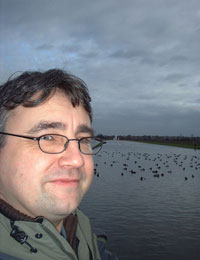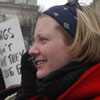
What a State of Mind: Interview with Ian Vince
The outrageously Orwellian, quintessentially British and only marginally fictitious Department of Social Scrutiny (DOSS) is an award winning website from the mind of Ian Vince, a London writer who also brought the world the uniquely surreal travelogue to Trepanning, a Cornish village "so remote it's on its own outskirts" filled with absurdly quotidian paranormal elements.
Ian has just published his first book based on DOSS, Britain: What A State. The book, which is both a visual and intellectual treat, is a complete guide to life in the United Kingdom, noting helpfully that the book is a choking hazard and offering official government application forms for such sundry activities as death. It has been selling extremely well, briefly reaching the top 100 in Amazon.co.uk sales. Here Ian tells us where the website and the book came from, and where they're going.
Check Please!: Congratulations on the book release! How have sales been so far?
Ian Vince: After an excellent first 2 weeks, they have slowed down considerably - but it's a Christmas book, so it doesn't really start to get interesting until the last week of November.
CP!: Could you tell me a bit about how the Department of Social Scrutiny website got off the ground. I seem to recall it was an entry in a contest.
IV: Indeed, it was for Channel 4 Television here in the UK. It was called the Comedy Circuit Competition.
CP!: Is this an annual competition, or was it done in the flush of the dot-com bubble?
IV: I think they wanted to make it a regular thing, but I think budgets got shifted around and it never went beyond the first. It was the rear end of 2002.
CP!: Did DOSS pre-date the contest, or did you conceive of the website in response to the contest?
IV: Both really. DoSS was the title of a double page comedy feature "form layout" in a local listings magazine I used to edit back in 1998. I was looking for a way of doing more of them because I enjoyed doing them so much and lots of people filled them in and sent them to the magazine - more feedback than we'd ever had to any competitions we ran or surveys of readers' tastes. People really took to them, they seemed popular. When faced with the task of creating an entirely new website after Trepanning - something a bit more mainstream, the Department of Social Scrutiny seemed like an ideal choice.
CP!: The DOSS website indicates that you had to wait for your agreement with Channel 4 to expire before developing the site further. Do you think winning the Comedy Circuits competition was more of a help or a hindrance?
IV: Definitely a help - it was great to work with a project manager and an editor, the discipline of having them look over my copy just spurred me on and encouraged me to create something far more planned than I would have done otherwise. The site went up, however, on the back of a hefty, yet unpaid, contract with Channel 4 - and there was some controversy over rights which had to be sorted out.
CP!: So Channel 4 gave you technical assistance?
IV: Yes, they had a funky new media firm from Brighton - a funky south coast seaside resort - work with me to put together the C4 site and do fancy java script things.
CP!: So DOSS represented an investment for them. How did you manage to wrest back control of it? I am assuming they have more lawyers than you.
IV: Infinite lawyers versus small-town schmuck, yes. I had them write a sunset clause into the contract to revert the rights. That was always the intention of the commissioning side, but their lawyers didn't seem to actually want to write it in, but after three drafts we got there.
CP!: So you got a nice technical boost in designing the site, great publicity from the win, and then, after the contract expired, full rights to the property again. Sounds like they need better lawyers.
IV: Though no money for content changed hands, they still host their version of the site uncontested as a kind of rampant pop-up farm and the whole project was sponsored by a third company.
CP!: Did you plan to develop DOSS into a book after you got the rights back, or did the idea of a publication emerge after you had begun developing the site?
IV: I knew there was some commercial angle, but I wasn't necessarily thinking of it as a book. It was more like my portfolio site for a while. Then I sent one of the forms from the site to the editor of a likely looking magazine and he asked me if I wanted to talk to his agent.
CP!: How much time elapsed before you succeeded in hooking up with your agent?
IV: Six months from buying the domain to securing an agent.
CP!: That is pretty rapid. I think many webmasters have the idea that they will become a published author when founding their sites - I know of several who have been fruitlessly pursuing that goal for years.

IV: I did have a very good run of serendipity.
CP!: So the agent was basically sold on one of your forms; how did the idea for a comprehensive guide to Britain arise from there? I can think of other directions you could have gone (though probably none so good).
IV: It was always going to be about bureaucracy, but it's a British disease and my Editor at Boxtree, Natalie Jerome, boiled it down as a guide to Britain - we then agreed to marry the concepts into a bureaucratic guide.
CP!: Could you walk me through the steps a bit: your agent buys into the concept of a book based on your work, and manages to get you connected with a publisher. The publisher and you hammer out the details of what will be produced... Actually that seems unusual. Normally one hears that editors/agents only want to see finished manuscripts.
IV: My agent specializes in non-fiction - most non-fiction books seem to be sold on a proposal, a synopsis and a sample chapter. Britain: What A State, for example, is not only a book but a business proposal. Christmas gift books are big business and every publisher wants to publish this year's big title.
CP!: So you found a way to plug your content into a publisher's business plan.
IV: The process is quite well established.
CP!: I think a challenge for many is translating their webpages into a book that someone would want to read. Most of us specialize in short articles and it is difficult to turn that into a longer narrative.
IV: An easy way to achieve this is to think of your book as a very large magazine. You don't get the narrative - or perhaps you get a thin or weak narrative, but it's the funny that counts. Even so it is a challenge. I think in part this may be because laying out a magazine involves conceiving of the publication as a whole - even if the individual articles are shorter, a good writer needs to balance different kinds of material into a decent flow.
CP!: And "what a state" does have a strong flow - it's the bureaucratic story of a person's life, which is a great framework. Birth to afterlife with proper paperwork for each. That's inspired.
IV: I tend to talk about comedy books by using a TV metaphor - I'm not writing a sitcom, I'm writing a sketch show. Of course that sketch show has a identifiable style, no matter how many different sketches are in it, and that style comes from the writer - it's their perspective on the world. Like many things, it's about developing a voice. The voice is what carries it.
CP!: Developing a voice and breaking out of the "Onion-clone" mold is already a challenge. But even then it doesn't always translate well to a book.
IV: And you may well have to adjust your voice from one medium to another. I relished the idea of writing long copy I wouldn't have got away with on the web.
CP!: What did you do before you started your websites?
IV: Magazine editor and after that, webmaster.
CP!: So you had a background in writing and editing before taking this on. I understand you took time off to complete the book. Are you a full-time writer now? I mean, is your next step to find another editing job, or to work full-time on the next publication?
IV: Well, I'm full time now. In fact I have just sold another book today.
CP!: Congratulations! Is this to the same publisher?
IV: No, and it's me and a new writing partner on a completely unrelated book. I'm now going to work on the proposal for the sequel to What A State, so I'll be writing 2 books this winter. Sometimes I wonder if I'm in some kind of fairy tale....
CP!: In terms of the details, how does one actually make money through these deals - do you get an advance upon signing, and then royalties thereafter? Or is part of the advance held until a manuscript is completed? In short, are you actually making a living?
IV: I am actually making a living, yes. You sign for a decent advance - this being a well-tested commercial proposition for the publisher - you get a third on signing, third on delivery, a third on publication. Then, if all goes well and the book sells enough to buy out your advance, you get royalty cheques twice a year.
CP!: Do you have any advice for aspiring writers who aren't quite in the fairy tale yet?
IV: Develop their voice, learn a subsidiary skill like page layout or photography and take the blue pill.




